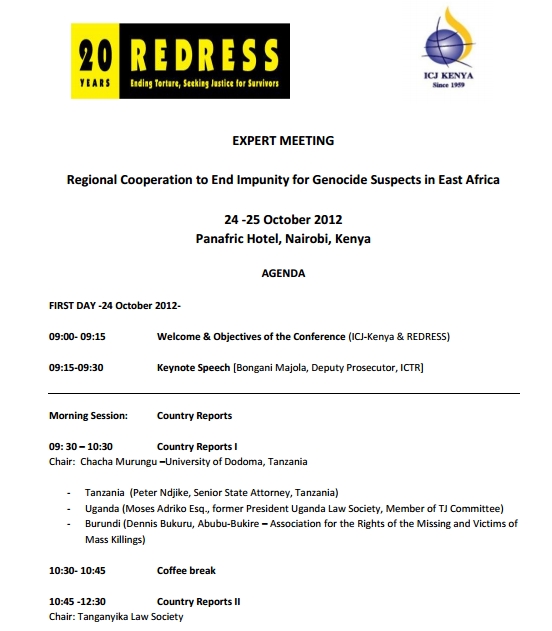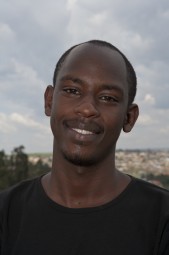
From 24th to 25th October 2012, prosecutors and judges from East African countries, representatives from the UN International Criminal Tribunal for Rwanda (ICTR) and the International Conference on the Great Lakes Region (ICGLR) as well as experts from civil society met in Nairobi to explore various options of how suspects of the 1994 genocide in Rwanda who currently benefit from impunity in the region, could be held accountable, and how justice could be provided to survivors. The expert meeting was convened by REDRESS and the International Commission of Jurists – Kenya section, two human rights organisations working to end impunity for crimes under international law.

At the meeting, SURF’s Legal Advocacy Coordinator, Albert Gasake spoke on “Survivors’ perspectives on justice for the 1994 genocide committed against Tutsi in Rwanda.’’ A copy of the presentation is available here, which concluded:
The closure of gacaca and completion of the ICTR’s mandate opens up a new space for discussion on reparation for survivors. While the previous focus of the Government of Rwanda, and the international community, was on accountability of perpetrators, the focus should now shift to the survivors. They not only have a right to reparation under international law, but they were also instrumental in ensuring the various judicial procedures accomplished there. We call on East African countries including Rwanda and the international community to support the call for reparation for survivors of the genocide in Rwanda, which truly will deliver justice for survivors largely denied to them through the limited mandate of the ICTR.
At the meeting, there was a general consensus among experts that accountability for crimes under international law, including genocide, crimes against humanity and war crimes, is a responsibility of all states. Regional cooperation of investigators, prosecutors and judges in the investigation and prosecution of these crimes, as well as political will to support these prosecutions, are key components to end a culture of impunity that presently exists within the region. Important lessons have been learned in Rwanda, where relevant domestic legislation was introduced and capacity was built within the police, prosecution and judiciary to prosecute crimes under international law. In Uganda, specialised war crimes units were established within police and prosecution services, and similar efforts are currently under way in Kenya. A sophisticated cooperation mechanism exists in the region in the form of the ICGLR which can assist national authorities to hold suspects accountable on a national level, or to extradite international crimes suspects. Accordingly, experts agreed that important progress has been made, and that a legal and practical framework exists for prosecuting perpetrators of international crimes, yet that more efforts need to be undertaken to effectively fight against impunity.
Focal or contact points within national prosecuting authorities could be appointed and a practitioners’ network of prosecutors with experience and expertise in international criminal law could be created to further advance cooperation in the region. National legislation needs to be further amended to allow for the prosecution of crimes committed in Rwanda in 1994. Practitioners should explore further the potential of the Great Lakes Pact and its relevant protocols to assist in the fight against impunity. Efforts to provide reparation to victims need to be explored with a view to provide tailor made solutions, and reparation should include more than ‘only’ compensation.
